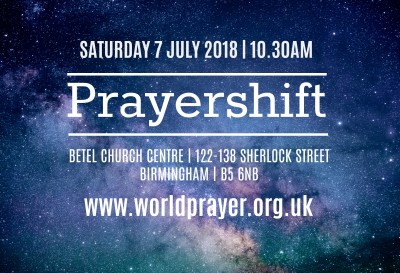Global: IJM prayer requests
12 Jul 2018South Asia IJM are searching for two teenage girls being exploited by a private sex-trafficking network. IJM worked with police for weeks to rescue them, but at the last minute they were moved from the target location. Please pray for a new strategy to find the girls quickly, without tip-offs making the traffickers suspicious. Also, remember the Dominican Republic mother of two sex-trafficking survivors struggling to provide for her five children. The European expat perpetrator in this case is offering her increasingly large sums of money to drop accusations against him, but she refuses every time. May God strengthen her and provide for the family’s needs. Finally, thank God for Kevin Hyland, who leaves the role of UK independent anti-slavery commissioner at IJM this month. The role was created under the Modern Slavery Act of 2015, and his work has been groundbreaking in uniting forces from NGOs, the private sector, and the Government to fight modern slavery. Pray for wisdom in the selection of his replacement. See
Global: YWAM and refugees
12 Jul 2018It has been almost three years since the ‘refugee crisis’ was brought to the world’s attention. Hundreds of thousands, maybe millions, came like a flood from the Middle East and North Africa to Europe, fleeing war, drought, terrorism and pain. Many Christians responded compassionately, with thousands volunteering across Europe to serve the refugees who had left everything behind. Many YWAM workers got involved through serving on the shores of Europe, along the migration route and in destination nations like Germany and Sweden. On the island of Lesvos alone, more than 1,000 YWAMers served in the camp, with a combined effort of approximately 20,000 days of work! While the number of volunteers has decreased, displaced people are still coming and helpers are still needed to meet practical needs and build relationships with the people in the camps. In 2018 refugees no longer live in camps. Host nations face the challenge of integrating thousands into their society.
Talks have begun to try to reach an amicable separation between members of four conservative evangelical churches and the Diocese of Christchurch. The congregations of the four churches voted by large majorities to disaffiliate following the decision in May by the General Synod of the Anglican Church in Aotearoa, New Zealand and Polynesia to permit churches in New Zealand to bless same-sex marriages. Archbishop Philip Richardson, one of the Primates of the ANZP, has now met with senior diocesan staff and archdeacons and the vicars and wardens of the four parishes to discuss how their members could disaffiliate ‘in a respectful manner’ while maintaining good communication and leaving doors open. ‘This is a broken and painful place to be,’ Archbishop Philip said, ‘but we need to find a way to walk through this uncharted land that is gracious, hospitable and realistic.’ They now enter a three month ‘resignation/exit process’ so that ‘logistics are managed sensitively’.
UN agency risks climate goals
12 Jul 2018Transparency International has highlighted several flaws that could hinder the International Maritime Organisation’s (IMO’s) ability to deliver on its own climate goals in reducing carbon emissions. The report outlines several key policy issues and recommendations that the IMO, the United Nation’s leading shipping agency, must address in order to meet international standards for transparency, accountability, and integrity. These changes are essential if the IMO is going to honour its environmental and climate mandates and reach a reduction of greenhouse gas emissions of at least 50% by 2050. The IMO’s accountability policies are currently hindering policymaking and leaving the agency susceptible to private influence. While the IMO’s initial strategy adopted in April is a big step forward for the international shipping sector, more must be done to ensure the agency meets its targets. If left unchecked, shipping emissions could grow from 2.5% to 17%.
Japan: record rainfall causes disaster
12 Jul 2018Mudslides and flooding caused by torrential rain have killed 195, with the toll expected to rise further. 75,000 responders have been deployed for search and rescue operations. Further storms and landslides are expected, causing additional danger. Prime minister Shinzo Abe cancelled scheduled trips abroad to focus on disaster relief efforts. The UN was ready to provide support if Tokyo requested it. Parts of Japan had received 20 inches of rain, with Hiroshima, Okayama, and Hyogo inundated with even more. In two hours some cities were completely flooded as deluges fell across mountains and then funnelled down, forcing hundreds of thousands of people to flee their homes. Those unable to leave took shelter on rooftops as water and mudslides buried houses and vehicles. Pray for a Christian presence among the fearful and grieving.
Prayershift - July 2018
10 Jul 2018July’s Prayershift gathering was a powerful time of prayer and testimony. Ian Cole shared a range of powerful stories from his recent meetings with Arab Church leaders:
- Since 2010 more than 4 million people have come to Christ in Egypt - this is a growth of over 40% in the church. They focus on —LOVE - PRAYER - TRUTH; their deep love for their Muslim neighbours enabling them to forgive even after horrendous massacres and attacks has shaken the Egyptian nation.
- A prominent Iman asked to go to a church prayer meeting in Egypt, whilst there he had a vision of Jesus and a conversation with the Lord that led to the Iman giving his life to Jesus. He then confessed he was nervous about seeing his devout Muslim wife. When he returned home she told him she had had a vision of Jesus and given her life to Him at the same time as her husband!
- A young woman and her baby were hit by a truck. sadly the baby died and was put in the hospital morgue. The young woman went home to her family. They were all recent Christians and they said - "didn’t we read the Jesus can raise people from the dead?" They prayed from midnight till six o clock. At six a nurse walked past the morgue and heard a baby crying, she opened the door of the heavily refrigerated unit and saw the woman’s baby sat up.
- In Turkey, many churches (often small in number) are tripling in size with Christians joining them from the refugee population.
We prayed for a number of issues God laid on our hearts - why don’t you join us and pray into these issues as well:
- Europe Shall be saved - we pray for a fresh move of God across Europe and for young leaders to arise as Evangelists, prophets, and teachers to take the gospel forward.
- We pray for the Balkans - for God to turn back the flood of Islamic missionaries and for peace to be restored between Macedonia and Greece.
- We pray for turning in our nation
- We pray for those on the frontline in bringing unity - for protection on their families and relationships. Many are under savage spiritual attack.
- We pray against fear - for people in the workplace, schools, communities to have the boldness to heart God’s call to demonstrate His kingdom.
- We pray against the growth in drugs and knife crime
-
- Lord rescue 10 - 14 years olds who are being lured into drug gangs
- We pray your hand of protection on our towns and cities - the Police say they expect an escalation in violence over the summer - we pray against this.
- We pray against the drugs like black mamba and monkey dust, that rob people of their senses and kill, break up the gangs and rescue the victims
- We pray against those gangs claiming parts of our cities as their territories - we proclaim the earth is the Lords and everything in it, we pray against any no-go areas in our nation.
Steve Botham - Director of World Prayer Centre
Celebration of Hope June 2018 – Falkirk Stadium
09 Jul 2018Over 200 churches from central Scotland were actively involved in the Celebration weekend at Falkirk Stadium with Will Graham, from a total of 295 churches registered.
Before the Celebration, over 1550 took part in the Christian Life & Witness preparation classes held at 16 locations over 3 weeks in April, with 50 first-time commitments and 375 re-dedications and assurance of faith being made at these classes - 425 decisions even before the Celebration took place.
Attendance over the weekend was 9,500, with over 750 responses – 68% first-time decisions and 18% re-dedications plus others. Around 60% of Stadium responses were under 25 years, a trend that reflects what happened when Will was in Peterhead in October 2016 – of the 400 responses, half were under 25 years – there is definitely something stirring in that generation.
The evening sessions were live streamed and viewed in 87 countries, with over 31,500 devices registered as watching, resulting in 285 responses online – a total of 1,460 responses from the Celebration overall.
At the end of June, the meeting of the Falkirk ministers/leaders forum who invited Will and played a key role in the Celebration was ‘buzzing’, with each one present keen to share their highlight or personal story, sharing their joy at God working in so many lives!
Because it’s not just about the numbers. It’s about lives changed and transformed, it’s about family blessing and salvation; it’s about churches encouraged and many Christians having greater confidence in sharing their faith - seeing answers to prayer, seeing their ‘Be an Andrew’ invitations accepted and salvation resulting; and it’s about unity – the strong unity in the Falkirk Leaders Forum of around 25 ministers/pastors meeting monthly, forming friendships, praying for each other and their communities, creating the strong platform which resulted in the invitation to Will being accepted and from which God could operate so effectively; the unity amongst hundreds of counsellors, ushers and others from many churches serving together ‘As One!’ before and during the weekend; the unity of hundreds all around the nation and beyond praying faithfully for the Celebration.
Because of that unity, an outworking of Jesus’ prayer in John 17, God was true to his word (Psalm 133) and did command His blessing on the weekend and poured out His favour – especially with the Police, Council and Stadium authorities who were highly complimentary at the feedback meeting on how everyone had behaved and how tidy the Stadium had been left each day. “You are welcome back anytime,” was their overall view!
We are now in the crucial follow-up period. Please pray:
• that every referral to a local church will be followed up swiftly, so that none may be ‘lost’;
• that every new Christian will be warmly welcomed by their new church family and will be faithfully mentored and discipled;
• for the ongoing protection of the Falkirk leaders’ forum and their families, and that God will continue to use their unity to build His Kingdom in that region.
Alistair Barton, Director, Pray for Scotland
Horn of Africa: Persecution
06 Jul 2018Hostility, injustice and violence are a daily reality for millions of Christians across the Horn of Africa. In Somalia the militant Al-Shabaab group frequently kills suspected Christians on the spot, and believers keep their faith completely secret. In Eritrea the government views Christians as agents of the West and will arrest, harass and kill them with impunity. Hundreds are imprisoned in horrific conditions. Ethiopia is a Christian-majority country, but converts from Islam are rejected by their families and communities. In Kenya Al-Shabaab militants cross the border from Somalia. They killed dozens of Kenyan Christians last year. In Djibouti rumours of conversion are often enough for believers to lose their inheritance rights or custody of their children. Imagine living where, because you’re a Christian, you fail your studies, your neighbours beat you up, your home is destroyed, your family is put in prison, your father is killed. Would you lose heart, give up, change your faith? Please pray for those experiencing this daily.







